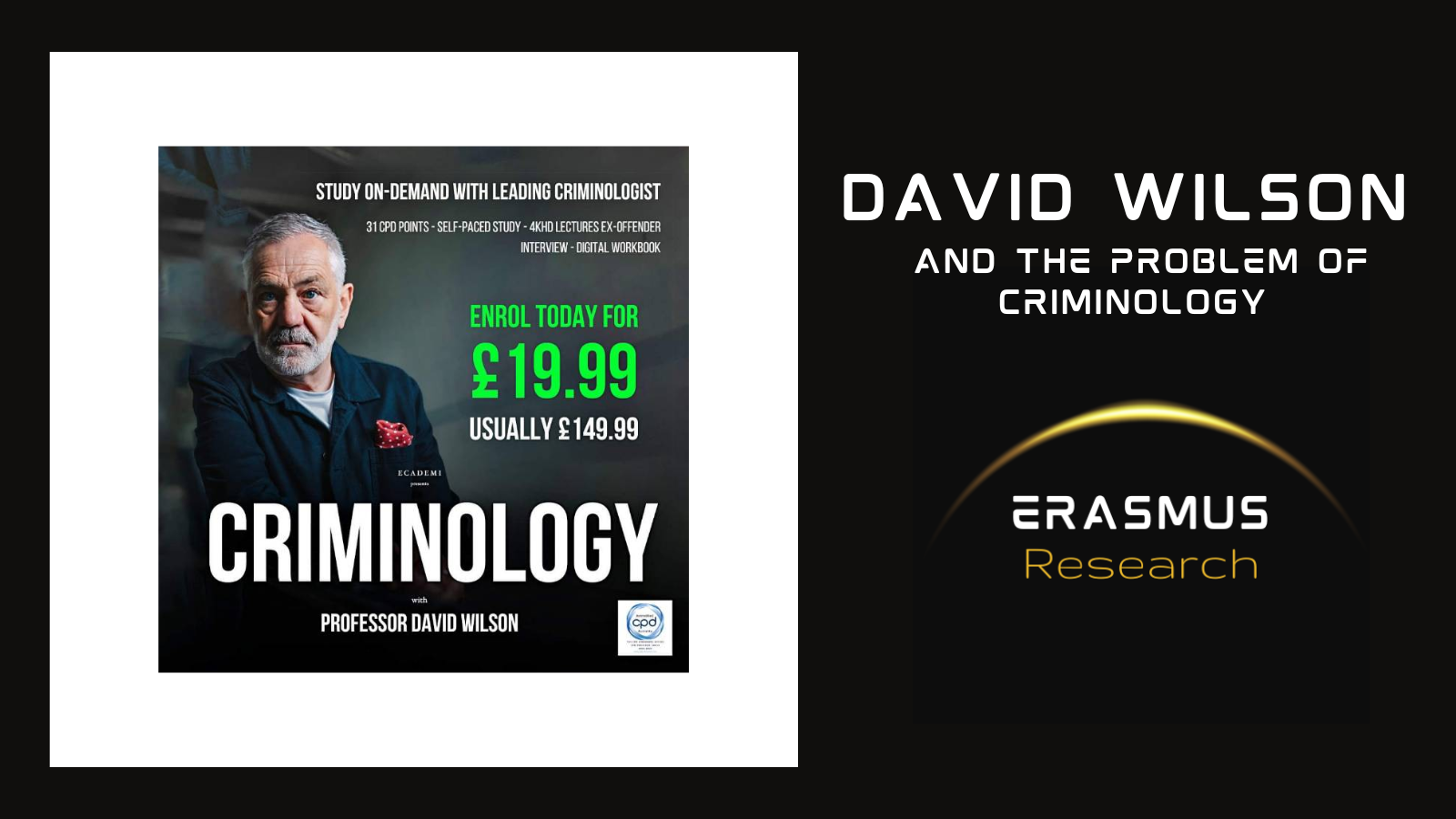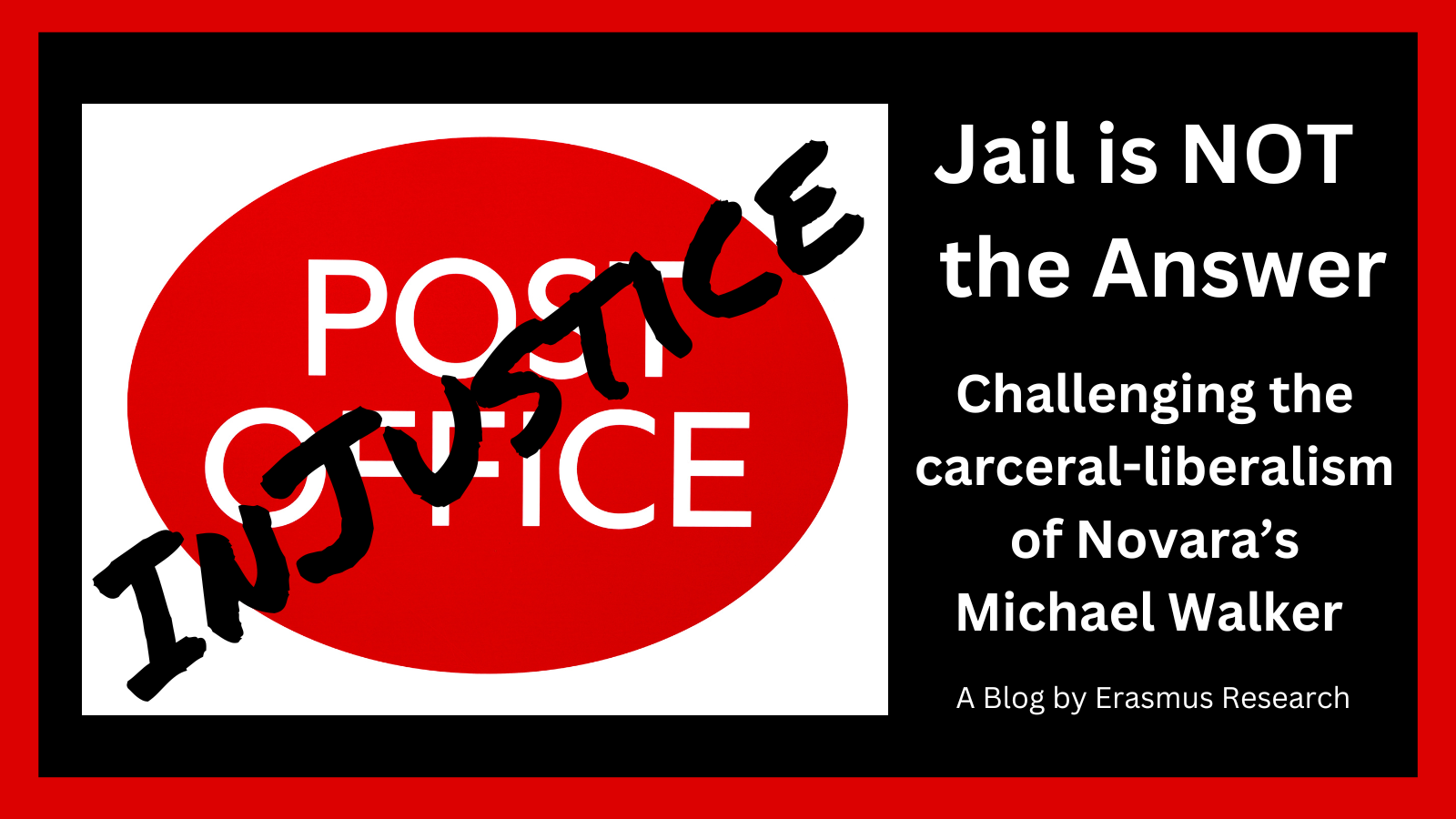David Wilson is something of a household name appearing regularly on television and radio as presenter and guest expert, columns in the Guardian and the Daily Mail, as well as producing a number of award-winning documentaries. He even has his own BBC Scotland show, Crime Files, capitalising on the country’s growing obsession with ‘true crime’, focusing particularly on murderers and serial killers. This popularity begs the question, what or who is a criminologist?
The phrase “criminology is a bastard discipline” is commonly attributed to the sociologist C. Wright Mills. Mills used this phrase to highlight the interdisciplinary nature of criminology and its lack of a singular, unified theoretical framework. This characterisation reflects the fact that criminology draws from various fields such as sociology, psychology, law, and anthropology, which can sometimes lead to a lack of coherence and consistency in its theoretical and methodological approaches.
That said, we still have, in most universities in the UK at least, ‘Departments of Criminology’, offering a range of degrees to a burgeoning cohort of students, many if not most of whom have designs on a career in either the police, or within what Angela Davis called the prison industrial complex. The conveyor belt of doctoral students largely supplies the demand for more teachers within these departments as student numbers augment in step with the country’s growing obsession with ‘true crime’ podcasts and the relentless copaganda that has become all-pervasive.
Here, we can see immediately that there are two opposing poles within this ‘bastard discipline’; the academic (theoretical) on one side and the professional (practical) on the other. David Wilson is fairly unique here in that he claims to have bridged both.
Is this possible? In order to test whether or not it is, it would be useful to measure Wilson’s writing against some kind of criteria. I would suggest something that is critical, theoretically informed, and acutely reflexive. I would suggest something like the work of French Sociologist Pierre Bourdieu.
In his seminal paper, Bourdieu’s Five Lessons for Criminology, Victor L Shammas draws ‘on a close reading of Pierre Bourdieu’s works, offer(ing) five lessons for a science of crime and punishment: (1) always historicize; (2) dissect symbolic categories; (3) produce embodied accounts; (4) avoid state thought; and (5) embrace commitment.
Before we use these criteria as the basis of an assessment into the scientific competence of Wilson’s work, we should perhaps look briefly at his background.
David Wilson completed his PhD at the Cambridge Institute of Criminology. The title of his PhD thesis was “The Long-Term Inmate: A Study of the Reaction of Long-Term Prisoners to Penal Policy”. His research focused on the experiences and adaptations of long-term prisoners within the penal system, exploring how they respond to and are affected by changes in penal policy over time. This was, it seems, suitably ‘safe’ enough in academic terms to warrant being recruited directly to Her Majesty’s Prison Service as assistant governor of HMP Wormwood Scrubs. Wilson would go on to have an illustrious career as a prison governor gaining a reputation for his work with serious offenders, including serial killers, traveling the world as an expert and advisor on issues relating to prison reform. After joining the Prison Reform Trust, Wilson joined University of Central England in Birmingham (now Birmingham City University) and was given a professorship in 2000. He is now an Emeritus Professor of Criminology and has acted as an advisor to several police forces. His ‘writing career’ has largely focused on serial killers and prison reform, and although he has held many senior positions in prison reform organisations, including vice chair of the Howard League and editor of the Howard Journal, his academic work, although popular, is not widely regarded in terms of its intellectual or academic rigour.
Why would this be?
Firstly, it is clear from a brief historicization of his own career trajectory that David Wilson has always been a central part of the establishment he writes about. His work on prison reform may seem progressive, however, his position as a mainstream personality, represents a more administrative and practical approach to crime rather than a progressive or radical one.
If we are to use the work of Pierre Bourdieu, the doyen of reflexive sociology, as a bench-mark, then it could be argued that Wilson is perhaps representative of the antithesis of critical or even reflexive thinking that makes possible challenges to the hidden power structures that permeate all forms of state control, including those within the so-called justice system and the prisons that serve it.
- Always Historicize
A reflexive or critical approach is essential to fully comprehend crime, considering how definitions and perceptions of crime have evolved over time. This involves looking at how historical events, cultural shifts, and changes in social structures have influenced what is considered ‘criminal behaviour’ and how societies respond to it. Historicization helps reveal the power dynamics at play in the construction of criminality. By examining the historical contexts, criminologists can see how certain behaviours are criminalized and how laws are applied selectively, often reflecting the interests of dominant social groups.
Wilson’s analyses often lack a deep engagement with the historical processes that shape contemporary issues. In his drive to make criminology accessible, Wilson over-simplifies complex issues, potentially ignoring the intricate historical and social dynamics that contribute to them. This simplification can lead to an incomplete understanding of crime and criminal justice, that reproduces, rather than challenges dominant narratives and orthodox thinking.
2. Dissect Symbolic Categories
Symbolic categories—such as “criminal,” “victim,” “justice,” and “law and order”—are not neutral; they are imbued with power and serve to reinforce existing social hierarchies. By dissecting these categories, criminologists can reveal how they are constructed, who benefits from them, and how they perpetuate inequalities. Categories often become taken-for-granted truths that shape how we perceive and respond to social phenomena. Bourdieu argues that by critically examining these categories, criminologists can challenge what is considered “natural” or “normal” and expose the arbitrariness and contingency of these constructs. Symbolic categories influence how social practices are structured and legitimized. By deconstructing these categories, criminologists can better understand the practices they justify and the implications for those subjected to them.
Wilson’s approach inadvertently reifies symbolic categories, treating them as fixed and self-evident rather than socially constructed and contested. By not critically examining symbolic categories, populist criminology can reinforce stereotypes and contribute to a simplistic understanding of crime and justice. Wilson’s work, aimed at a broad audience, often prioritises clarity and emotional appeal over critical depth. This can limit the extent to which audiences are encouraged to question and critically engage with the symbolic categories that shape their perceptions of crime and justice.
3. Produce Embodied Accounts
Third, as Shammas (2018) highlights – ‘social agents are corporeal agents: the locus of social action is not the rational-calculating brain but an embodied being, a ‘sensate, suffering, skilled, sedimented, and situated, corporeal creature’.
Embodied accounts focus on the lived experiences of individuals, capturing how social structures and power dynamics are felt and experienced at the bodily level. This approach ensures that criminological research is grounded in the real, everyday lives of people. The body is a key site where social inequalities manifest. By paying attention to how different bodies are treated, controlled, and disciplined, criminologists can uncover the ways in which power operates through the body, highlighting issues such as racial profiling, police brutality, and the physical and psychological effects of incarceration.
Although it can be argued that in respect of this point, Wilson fares reasonably well since his focus is often on individuals, this treatment often presents crime and criminal justice issues in abstract terms, focusing on statistics, policies, or high-profile cases without delving into the embodied experiences of those affected, beyond generalised discussion around a particular ‘serial killer’, or high profile ‘offender’. While Wilson’s approach effectively uses emotional appeal to engage audiences, it may not always capture the full depth of embodied experiences.
4. Avoid State Thought
Criminologists risk operating as uncritical state thinkers, bearers of those ‘categories of state thought that the state has produced and inculcated in each one of us’ (Bourdieu 2014, p. 108).
Avoiding state thought encourages criminologists to maintain a critical distance from official narratives and categories. This critical stance is essential for uncovering the underlying power dynamics and biases that shape state policies and practices. For Bourdieu, criminologists must produce independent analyses that are not overly influenced by state perspectives. State institutions often have vested interests in maintaining certain narratives about crime and justice that serve to legitimise their power. By avoiding state thought, criminologists can expose these interests and highlight the ways in which state practices may perpetuate social inequalities and injustices.
This is perhaps the biggest failing of Wilson’s work, which unquestioningly reproduces state categories, particularly when his analyses rely on official crime statistics, state definitions of criminality, or mainstream media portrayals that align with state interests. Wilson’s lack of critical distance means that he all too readily reproduces rather than submits to questioning, the common-sense tropes, the orthodox categories and the official narratives that shape the socially constructed world of crime and ‘criminals’.
5. Embrace Commitment
Embracing commitment means that criminologists actively involve themselves in social issues and use their research to advocate for change. This approach aligns with the idea that scholarship should have a practical impact on society, especially in fields dealing with pressing social issues like crime and justice. Bourdieu believes that criminologists have a moral responsibility to address the injustices they study. By committing to their work, they can help to rectify social inequalities and improve the lives of those affected by crime and the criminal justice system.
Wilson’s populist criminology often aligns with media narratives, which can prioritise sensationalism over substance. This media-driven focus results in an overemphasis on high-profile cases or dramatic incidents rather than systemic issues and long-term solutions. While Wilson’s work raises important issues, it lacks the activist component necessary for true commitment. Committed criminology involves not just highlighting problems but also actively working to address them through advocacy, policy influence, and grassroots engagement.
The bench-marking exercise above exposes the widening gulf between reflexive and critical criminological frameworks for scholarship and populist, media focused discourses around serial killers and serious offenders.
It would be naïve to think that if David Wilson was anything other than a centrist liberal, he’d be allowed anywhere near a TV studio, never mind having his own TV show. His celebrity status is predicated precisely on the fact that his individualistic and sensationalised output does not focus on corporate harms and crimes of the powerful. Just as talking about genocide in Gaza is the best way to end a journalism or politics career, talking critically, or reflexively about crime and justice, the police and the courts, will most probably preclude the speaker from ever being allowed to participate in this world at an operational level. Indeed, it would significantly hinder opportunities to appear on TV and Radio, write for the Daily Mail, or present a TV show.
For someone holding a professorship (now Emeritus), Wilson has remarkably few articles in peer reviewed academic journals. His long list of books, almost all of them on serial killers, suggests that it has been infinitely easier for Wilson to persuade a publisher that someone with an interest in true-crime will want to buy his book on murderers than it is to persuade a journal editor to forward his research to a panel of academic ‘judges’ for scrutiny in the cut throat and highly competitive business of peer-reviewed, academic journal publications.
If this sounds like intellectual or academic snobbery, it must be borne in mind that academia is one of the oldest traditions that endures today. The University of St Andrews, for example, predates the Inca Empire. There is no doubt that academic values, and academic freedoms have been eroded throughout the last few decades, during which time managerialism has infiltrated and, in most cases, appropriated the university sector, which now operates as a business. That said, traditions endure, and the idea that someone can go from PhD to Deputy Governor is one thing – that a prison governor can then segue into an academic professorship, without paying the standard entry fee of amassing an illustrious list of peer-reviewed research articles in the discipline’s most prestigious peer-reviewed journals raises questions about the state of criminology today.
To conclude, the case of David Wilson highlights a broader issue within the field of criminology: the tension between academic rigor and popular appeal. As a public figure, Wilson has undeniably succeeded in bringing criminological issues to a wider audience, leveraging media platforms to spark public interest and debate. However, when assessed against critical and reflexive criminological frameworks, as exemplified by Pierre Bourdieu’s principles, Wilson’s work reveals significant shortcomings.
Wilson’s tendency to simplify complex issues, rely on state-sanctioned narratives, and focus on sensationalized individual cases rather than systemic critiques, positions him more as a popular commentator than a critical criminologist, or social scientist. His career trajectory—from prison governor to media personality and professor—illustrates how mainstream acceptance and media visibility can sometimes come at the cost of intellectual rigor and critical engagement.
The field of criminology, with its “bastard” interdisciplinary nature, must balance the need for public engagement with the imperative of critical, theoretically informed scholarship. Wilson’s prominence raises important questions about what it means to be a criminologist today. Can someone whose work aligns more closely with mainstream media narratives still claim to be advancing the discipline? Or does this alignment risk diluting the critical edge that is essential for challenging and transforming the systems of power that some aspects of criminology seek to understand?







